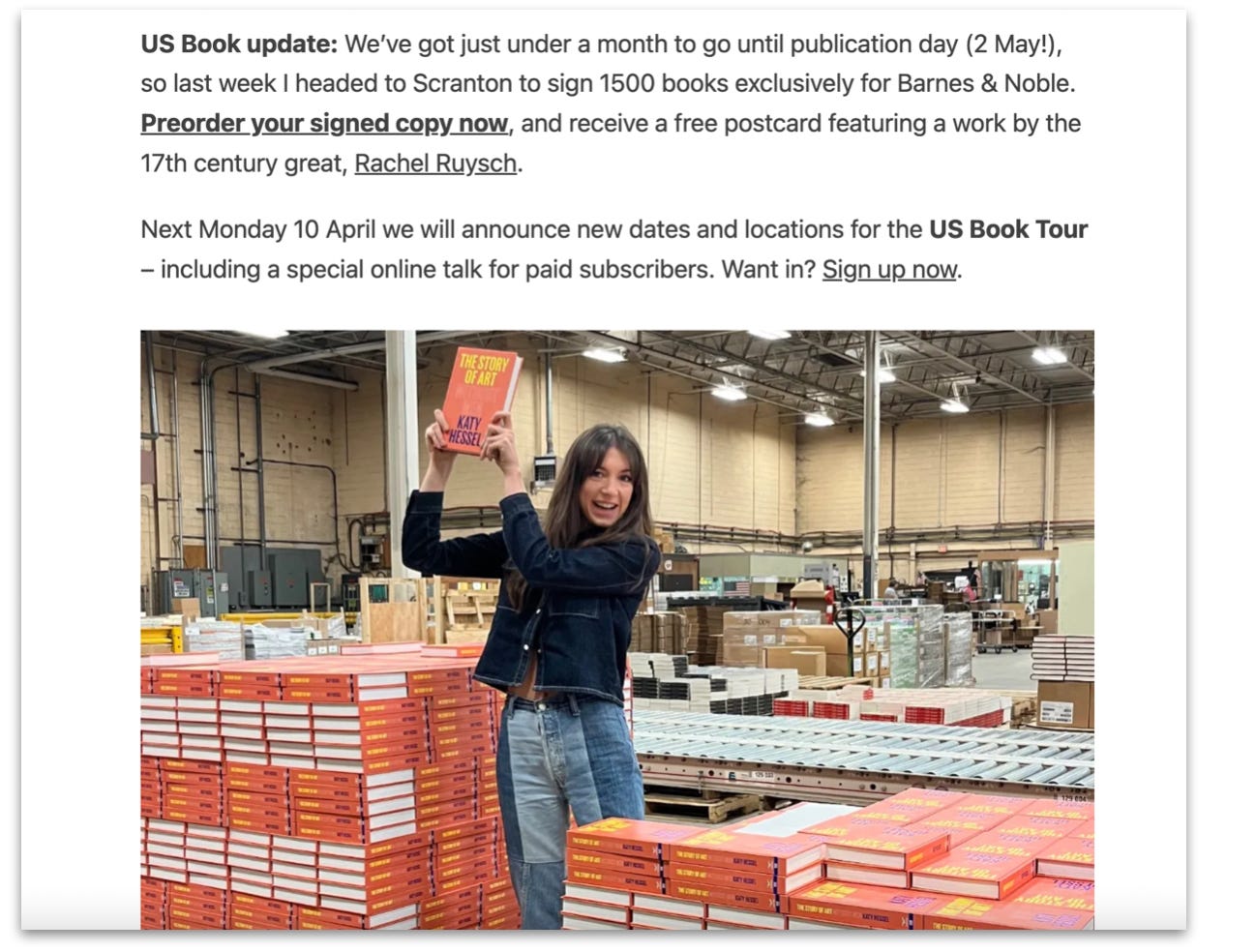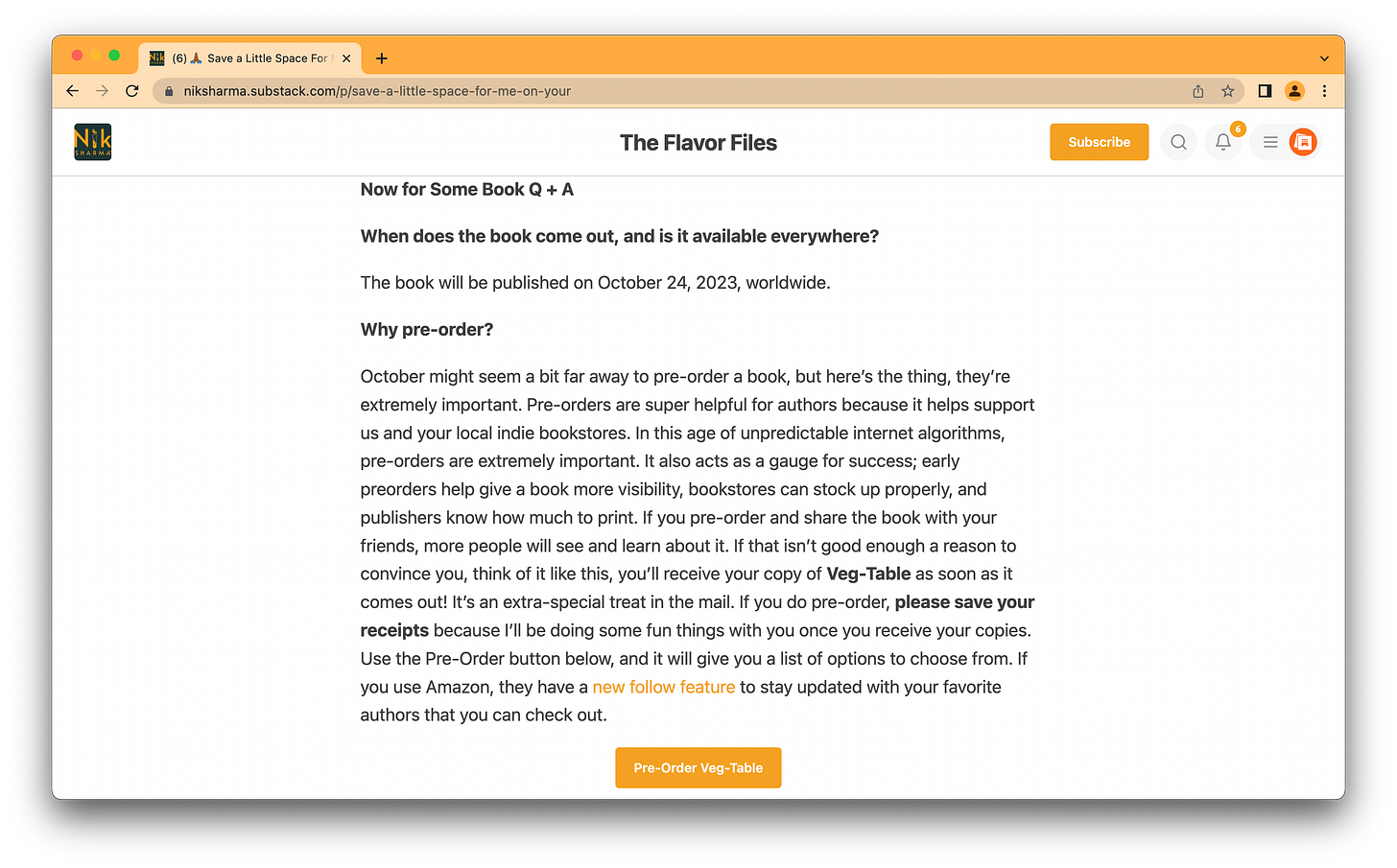There’s nothing that drives book sales like email. It’s a direct line of connection to your most passionate supporters, and, for many authors, Substack is the most efficient and powerful way to promote their upcoming and published books. Melinda Wenner Moyer told us, her publisher “credits [her] Substack for helping to drive continued sales. It’s sold just under 25,000 copies.”
In this guide you’ll learn how authors like Melinda use Substack to support their work as an author, including:
How to promote a new book, from preorders to the launch and beyond
How to promote existing books
How to grow your audience as you go
How to pitch your Substack to publishers
Download a PDF copy here:
Promote your new book
Authors on Substack don’t have to cater to algorithms or advertisers to connect with their readers. You can communicate directly with your subscribers at the most important moments in your career—like promoting a new book.
Preorders
A great preorder campaign includes the following ingredients:
Be loud and clear with your book announcement. You might be tempted to just include the announcement of your new book as an intro or footer in one of your regular posts. When you first make the announcement, we recommend creating a stand-alone post. Be bold about the fact that you’re launching a book—don’t bury the lede! For inspiration, see announcement posts from Gabrielle Blair, Virginia Sole-Smith, Yung Pueblo, and Freddie deBoer.
Encourage orders with custom buttons. Include a link to preorder your book above the fold using a custom button. Nik Sharma used custom buttons with a Q&A for readers so they had the full details on how to preorder. Learn more about buttons.
Tell your readers why this is important. Remind subscribers why preorders are important. Giulia Scarpaleggia tells readers, “Preorders are the best way to support an author and help a book succeed.” Additionally, she thanks them for being some of her most dedicated fans. Read the announcement post. Picture-book author Adam Rex got creative with his post about preorders, sharing a little of what readers could expect from the book. Finance writer Ben Le Fort told subscribers that if every single one of them preordered, they’d make his first major book a bestseller. Sharon Blackie shared a detailed story of why her publisher means so much to her, alongside her book announcement.
Get strategic. Consider:
Telling your paid readers first. Alison Roman announced her book tour to paid subscribers first, allowing her most dedicated fans to get access. She sold out three cities, and the next day she invited free subscribers and followers on social media.
Sharing special discounts. Taylor Lorenz offered subscribers 25% off preorders for one day only. Ben Le Fort offered readers subscription discounts of up to 60% for friends and family members preordering or for preordering three copies.
Using video. Maggie Smith shared a more personal message following the unboxing of her book and encouraged subscribers via video to preorder. Learn more about video on Substack.
Keep reminding about preorders. Freddie deBoer shares the link to preorder his forthcoming book at the top of every new post.
Book launch
Build up to launch day. Continue to build momentum up to launch day with behind-the-scenes moments, posts sharing your feelings about publication, and cover reveals. A book’s creation is a series of stories that you can share with your readers.
Celebrate publication week. For her publication date post, Lerato Umah-Shaylor shared a custom button for readers to buy the book. Authors can offer early and behind-the-scenes access to readers and incentivize them with special deals. Authors Gabrielle Blair, Heather Havrilesky, Virginia Sole-Smith, and Rebecca Makkai use Substack to drive sales for their books. Virginia also created a special section on her Substack so that she could get really detailed on the book news for superfans. When the book subsequently became a New York Times bestseller, she wrote:
“There is no doubt in my mind that this happened because of Burnt Toast. You preordered, you regular ordered, you library-requested, you left reviews, you talked the book up on social media and in your group texts, you did this.”
Go deeper with readers. Beyond launch week, authors start book clubs, run AMAs, and invite readers to meet them on their book tour.
Celebrate milestones. Maggie Smith sent out a Substack post when her book became a New York Times bestseller. Chris Cillizza shared a note when he was featured in the media.
Don’t forget to promote your Substack as part of your book launch too. Add your Substack URL (your.substack.com) to your author page Visit our brand assets and resources for more information.
Read more: How to promote your book on Substack
Ongoing promotion
Here are some ways writers can promote books after launch and continue to drive book sales on autopilot.
Add your books to your profile. Your Substack profile is a simple way to share all your social handles, web-profile presences, and books, all in one place. Update your profile.
List books as permanent links on your Substack homepage. Cookbook author Mark Bittman promotes his books on the homepage of his Substack, The Bittman Project. Update your homepage links.
Headers and footers. Writers can create headers and footers for all emails, which can be bespoke for free and paid subscribers (head to Settings, Publication Details, Email banner, header, and footer settings). Mason Currey created a custom banner displaying his books, which he adds to the bottom of all his posts.
Create a growth loop with your audience
Here are some ways authors are growing their Substack audience alongside their ongoing book sales.
Include your Substack on your “About the author” page in the finished book. We are seeing more art departments checking in on using the Substack logo with their personal URL for back pages of the published book. This is a great way to bring new readers to your newsletter.
Share the ongoing journey. Katy Hessel updated subscribers on the U.S. leg of her publishing journey, to drum up preorders and interest after a successful U.K. launch—at the same time inviting those wishing to see U.S. book tour details to upgrade to paid.

Invite subscribers to endorse your book. Virginia Sole-Smith welcomed endorsements of her book her Substack subscribers, which she then shared in Notes. Virginia also regularly mentioned her Substack in interviews in the media and on podcasts about her book. This creates a loop of growth that allows your Substack to grow while your book sales do, and vice versa.
Here are some other ways to make full use of the Substack network to increase your growth through your book launch and beyond.
Write blurbs and recommendations of other authors. Authors can make use of Recommendations to help grow their publication as part of the Substack network. Writers who make a recommendation are three times as likely to receive one. What’s more, you can turn any recommendation written about your publication into a blurb for your book or an endorsement on your welcome page. Read: How to set up endorsements on your welcome page.
Guest post or interview with other Substack writers. Maggie Smith answered Oldster’s interview questionnaire, Rebecca Makkai was interviewed by Substack writer Jane Ratcliffe inBeyond about Rebecca’s book, and Elizabeth Holmes spoke to Sally Bedell Smith about her book on the British royals.
Notes. Substack Notes is a space where you can publish short-form posts and share ideas with other writers and readers on Substack. In its early days, some writers are already seeing subscriber growth from it. Visit A guide to growth and collaboration on Substack Notes.
Pitch your Substack audience to agents and publishers
In December 2020, cookbook writer Caroline Chambers started her newsletter after being rejected by traditional publishers for not having enough “social reach.” In April 2023 her book of the same name sold after demonstrating an email list of more than 60,000 subscribers on Substack.
Caroline’s story isn’t the only example of Substack writers getting a book deal because of the audience they’ve cultivated here—morning person’s Leslie Stephens and Valorie Clark of Unruly Figures both credit their book deals to their Substacks.
If you’re speaking with potential agents and publishers, make sure to highlight your Substack audience, and how engaged they are, by including engagement metrics such as open rates and free and paid subscriber numbers.
Remember to make clear that on Substack, audience size isn’t the most important metric. When your open rates are 50% or more, you know that you have a very engaged and captive subscriber base, which is essential for book sales. (Comparatively, social media posts may reach only 1% to 3% of your follower base.)
You can also share where your readers are in the world by using the Audience insights tab in Stats. Toggle between where subscribers are located around the world by country and by states in the U.S. You can also sort the data by all subscribers or paid subscribers and time period—last 30 days, last 60 days, or all time. You can sort the same data in your subscriber dashboard to send targeted emails. For example, send an email to all U.S.-based subscribers about an upcoming book tour.
The insights also display audience overlap with other publications to help writers spot opportunities for collaboration.
Looking for more guidance? Read our guide on How to promote your book on Substack and our interviews with authors Melinda Wenner Moyer and Luke Burgis.
Are you a publisher wanting to onboard your writers to Substack? Write to us at partnerships@substackinc.com for support and guidance, and to grab your affiliate link.
Are you a book author selling your book via Substack? Share what other tactics and methods you use to do so, in the comments.














